In Kenya, maintaining the integrity of medical facilities and pharmaceutical storage environments is of utmost importance. Proper environmental control ensures that medications, vaccines, and other medical supplies remain effective while safeguarding sensitive medical equipment. One key aspect of environmental control is humidity regulation, which can be accurately monitored and maintained using hygrometers.
A hygrometer is a device that measures humidity levels in the air, providing essential data for maintaining optimal conditions in various settings. In medical and pharmaceutical environments, keeping humidity within strict ranges is crucial to prevent degradation of medications and damage to medical equipment. This article explores the critical role hygrometers play in ensuring safe and effective storage and operation in Kenya’s healthcare sector.
Why Humidity Control is Essential in Medical Facilities
Medical facilities in Kenya, such as hospitals, clinics, laboratories, chemists and pharmaceutical storage areas, need precise humidity control for several reasons:
- Preservation of Pharmaceuticals
- Medications and vaccines are highly sensitive to environmental conditions. High humidity can cause pharmaceutical products to degrade, lose potency, or become unsafe for use. For instance, humidity can cause powders to clump, tablets to dissolve, and certain medications to undergo chemical changes that reduce their efficacy.
- Protecting Medical Equipment
- Medical devices such as MRI machines, CT scanners, and other electronics are vulnerable to both high and low humidity levels. Low humidity can lead to static electricity buildup, damaging sensitive components, while high humidity can cause condensation and corrosion, leading to malfunctions or breakdowns.
- Ensuring Patient Safety
- In critical environments such as operating rooms, intensive care units (ICUs), and neonatal units, maintaining proper humidity is essential for both patient comfort and the prevention of infections. Hygrometers ensure that these environments are kept within safe humidity ranges, protecting both patients and equipment.
Ideal Humidity Levels for Medical and Pharmaceutical Environments
The ideal humidity range in most medical environments is between 40% and 60%. Going below or above this range can result in several negative consequences:
- Below 40%: Low humidity levels can dry out mucous membranes, potentially leading to respiratory discomfort for patients and healthcare staff. Additionally, it can cause static electricity buildup, which is dangerous for sensitive medical equipment.
- Above 60%: High humidity levels can lead to the growth of mold, mildew, and bacteria, which can compromise the sterility of medical supplies and lead to infections. For pharmaceuticals, high humidity can degrade products, making them unsafe for patients.
Key Benefits of Using Hygrometers in Medical Facilities and Pharmaceutical Storage
1. Ensuring Proper Pharmaceutical Storage Conditions
Pharmaceuticals, especially vaccines, must be stored in conditions that meet specific regulatory requirements to remain effective. For example, vaccines may lose their potency when exposed to incorrect humidity levels, leading to ineffective immunization programs. Hygrometers are crucial tools for monitoring and ensuring that humidity levels remain stable in pharmaceutical storage rooms, warehouses, and cold storage areas.
- ThermoPro TP90: This smart WiFi hygrometer is an excellent option for large pharmaceutical storage facilities. It provides real-time monitoring and can transmit data via a 2.4GHz WiFi connection, allowing for remote tracking of humidity levels through a mobile app. This ensures that any deviations from the ideal range can be immediately addressed.
2. Maintaining Optimal Conditions in Medical Laboratories
Medical laboratories handle sensitive biological materials that must be kept under controlled humidity levels to ensure accurate test results. Hygrometers help lab technicians monitor humidity and make necessary adjustments to avoid contamination, equipment malfunction, and degradation of samples.
- ThermoPro TP60C: This wireless hygrometer is perfect for laboratories where environmental conditions must be carefully controlled. Its waterproof sensors make it ideal for areas where liquids are present, and its long-range capabilities allow monitoring across multiple zones.
3. Protecting Medical Equipment from Humidity Damage
Medical equipment represents a significant investment for hospitals and clinics. Machines such as dialysis equipment, ventilators, and surgical instruments must be kept in environments where humidity is tightly controlled. Hygrometers help prevent condensation, which can lead to corrosion and electrical malfunctions, ultimately prolonging the lifespan of expensive equipment.
- ThermoPro TP200B: This hygrometer, equipped with waterproof sensors, is perfect for monitoring humidity in areas where medical equipment is stored. Its rugged design ensures accurate readings even in challenging environments, helping facilities maintain the right conditions for their devices.
Indoor Thermometer
ThermoPro TP200B: Waterproof Thermometer – Outdoor & Indoor Thermometer
4. Maintaining Sterile Environments
In medical facilities, maintaining a sterile environment is critical to preventing infections. Hygrometers help ensure that operating rooms, ICUs, and other sterile areas remain free of excessive moisture, which can lead to the growth of bacteria and mold. Hospitals can track humidity levels in real time, ensuring that these critical environments remain safe.
- ThermoPro TP357: This smart Bluetooth hygrometer is ideal for monitoring multiple locations in a medical facility. It transmits data to the ThermoPro Sensor App, making it easy for healthcare administrators to monitor humidity in operating rooms, storage areas, and other critical spaces from a central location.
5. Humidity Control in Cold Rooms for Pharmaceuticals
In cold storage facilities, such as those used for storing vaccines, medications, and temperature-sensitive biological materials, controlling both temperature and humidity is essential. Excessive humidity can cause condensation, leading to mold growth and contamination of medical supplies.
- ThermoPro TP49: This compact hygrometer is ideal for monitoring small cold storage areas where pharmaceuticals are stored. Its accurate readings of current humidity levels help ensure that vaccines and other temperature-sensitive products remain viable.
Regulatory Compliance for Medical and Pharmaceutical Storage in Kenya
Kenyan medical facilities and pharmaceutical companies are required to comply with various international standards for humidity control. These include:
- World Health Organization (WHO) guidelines for pharmaceutical storage, which emphasize maintaining specific humidity levels to ensure drug safety and efficacy.
- Good Storage Practice (GSP) regulations, which stipulate that facilities storing medications and vaccines must use environmental monitoring systems, such as hygrometers, to ensure compliance with humidity control standards.
By utilizing high-quality hygrometers, medical and pharmaceutical facilities in Kenya can easily meet these regulatory requirements, ensuring both patient safety and product integrity.
The Role of Hygrometers in Monitoring Multiple Zones
Medical facilities and pharmaceutical storage units often consist of multiple zones, each with its own environmental control needs. For instance, operating rooms, cold storage areas, and laboratory spaces each require specific humidity levels. Using a system of connected hygrometers allows facilities to monitor different areas simultaneously, ensuring that each zone maintains the correct environmental conditions.
- ThermoPro TP357: With Bluetooth capabilities, the TP357 can be used in different zones of a facility, providing real-time data on humidity levels. This flexibility allows administrators to maintain ideal conditions in all critical areas, from storage rooms to surgical theaters.
Cost Savings through Humidity Control
Maintaining proper humidity levels in medical facilities and pharmaceutical storage areas results in significant cost savings:
- Reduced Equipment Downtime: Proper humidity control ensures that medical equipment remains in good condition, reducing the need for repairs and preventing equipment failure.
- Prevention of Pharmaceutical Loss: By maintaining the correct humidity levels, facilities can prevent medications and vaccines from degrading, minimizing product loss and ensuring patients receive effective treatments.
- Energy Efficiency: Hygrometers enable healthcare administrators to optimize HVAC systems, leading to energy savings while still maintaining ideal environmental conditions.
In Kenya, the role of hygrometers in medical facilities and pharmaceutical storage cannot be overstated. These devices provide accurate, real-time data that ensures medications, vaccines, and sensitive equipment are stored and used in optimal conditions. From maintaining sterile environments to protecting valuable medical equipment, hygrometers are vital for operational efficiency, patient safety, and regulatory compliance.
Whether it’s the ThermoPro TP90 for large pharmaceutical storage areas or the ThermoPro TP357 for monitoring humidity in laboratories and operating rooms, using hygrometers is a cost-effective solution that brings long-term benefits to Kenya’s healthcare industry.

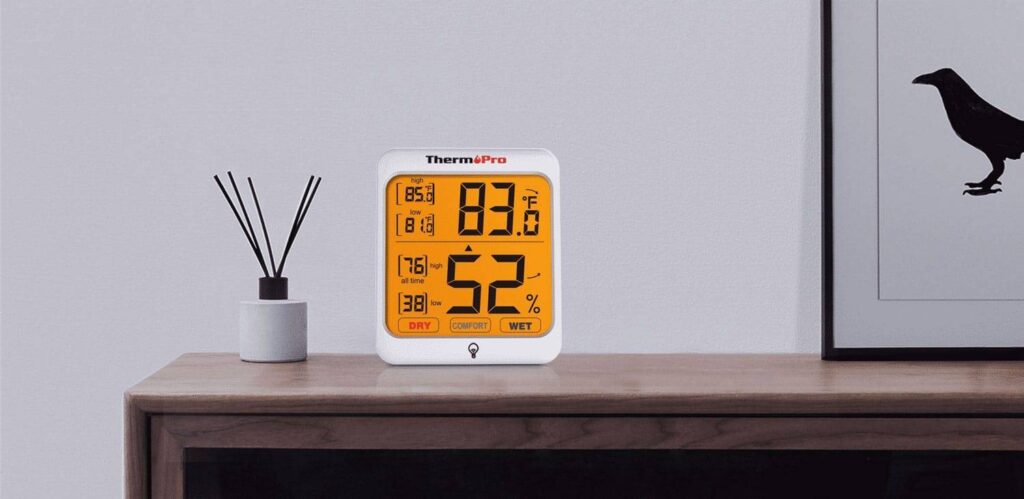
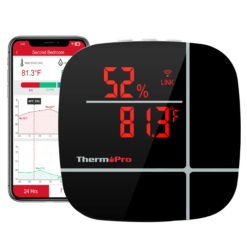
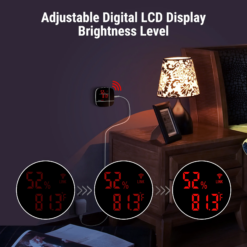
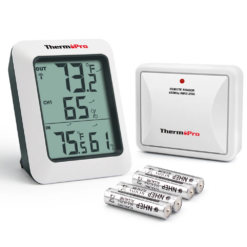
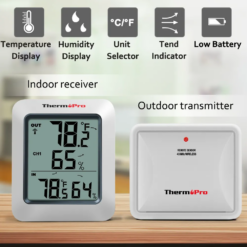
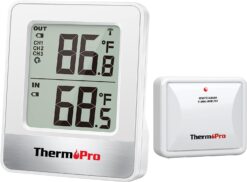
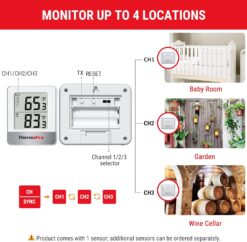
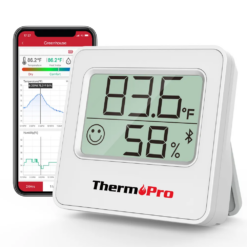
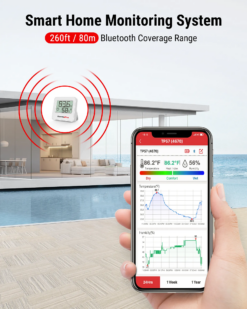
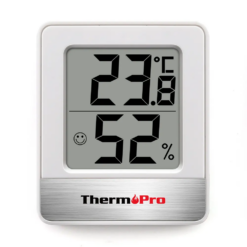
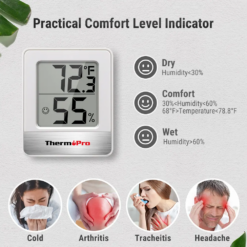
Pingback: Prevent Mold and Allergies with Thermopro TP49 in Kenya